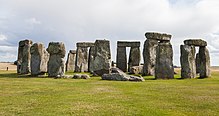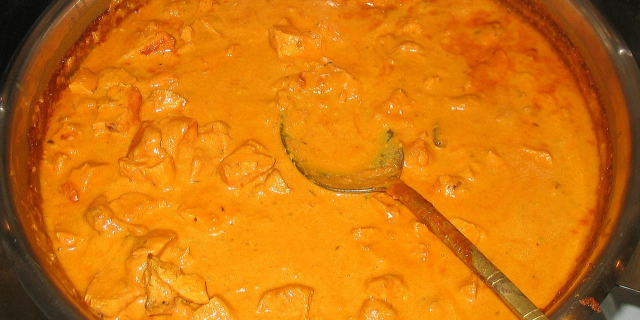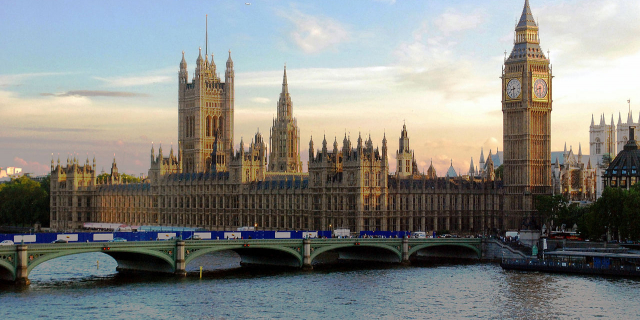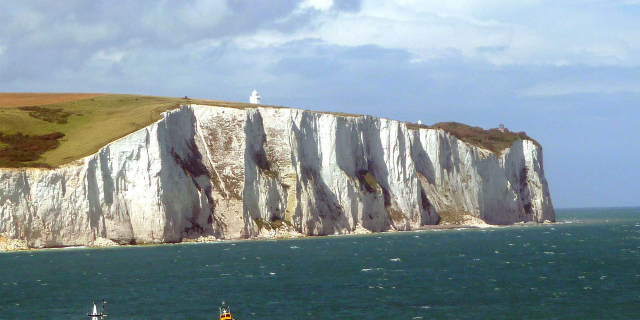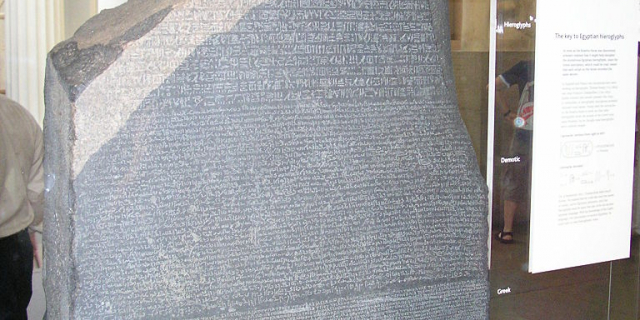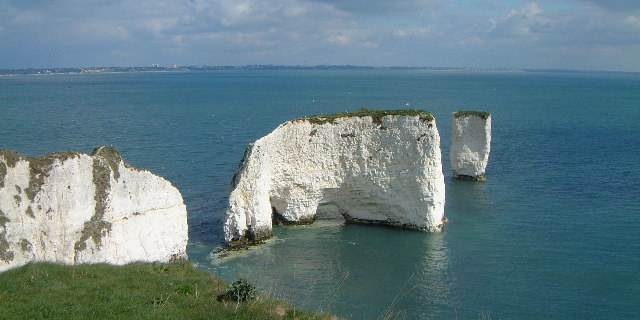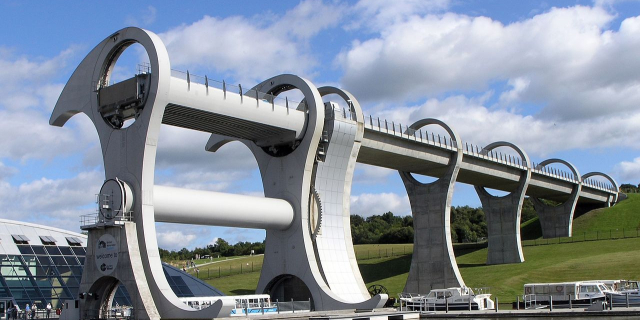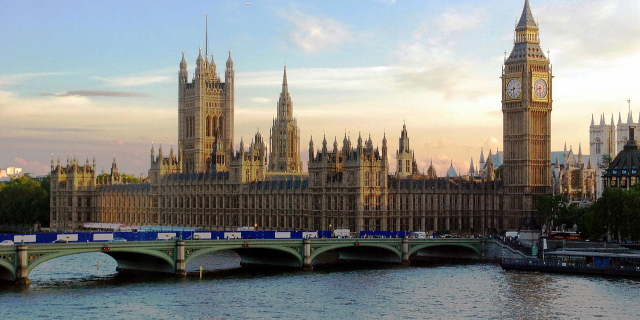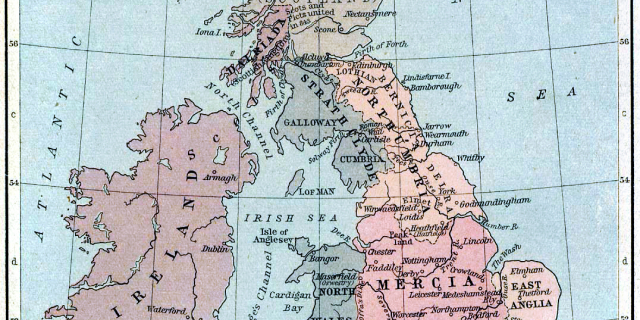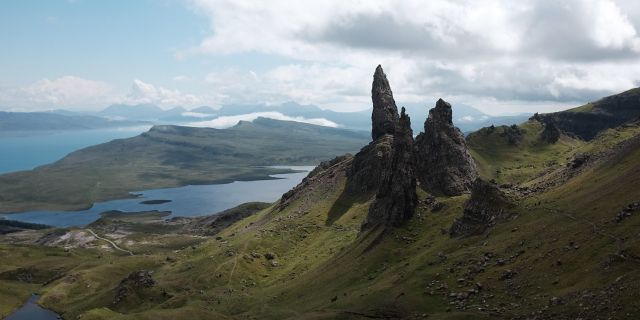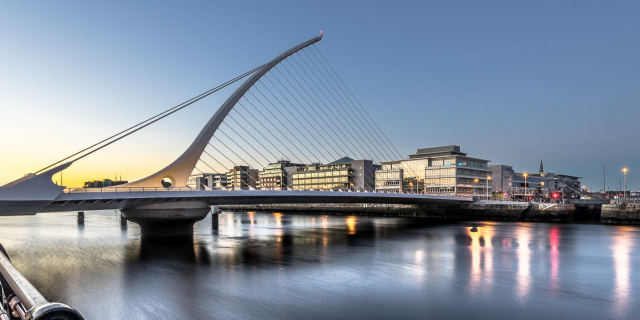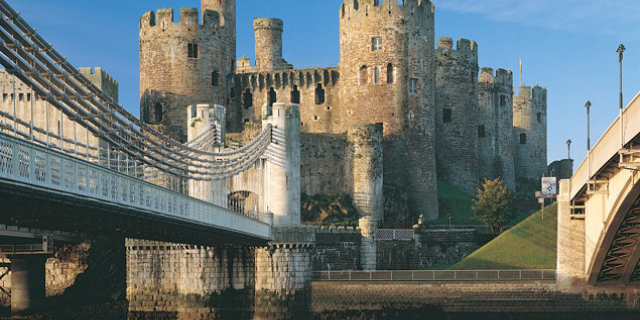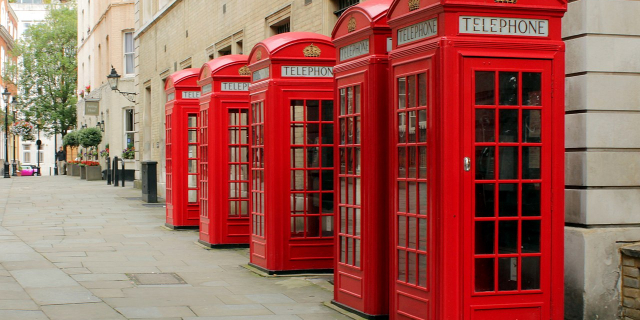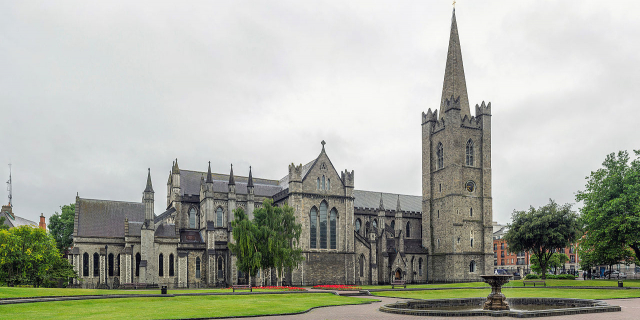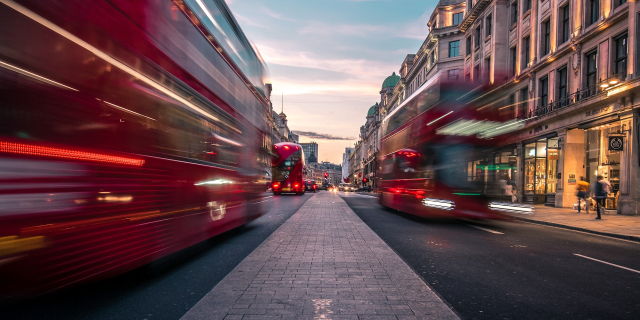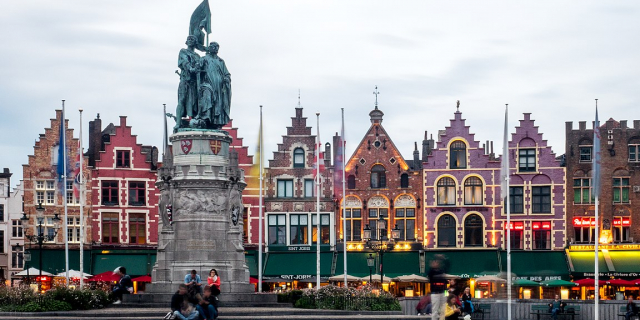United Kingdom
Context of United Kingdom
The United Kingdom of Great Britain and Northern Ireland, commonly known as the United Kingdom (UK) or Britain, is a country in Western Europe, off the north-western coast of the continental mainland. It comprises England, Scotland, Wales and Northern Ireland. The United Kingdom includes the island of Great Britain, the north-eastern part of the island of Ireland, and many smaller islands within the British Isles. Northern Ireland shares a land border with the Republic of Ireland; otherwise, the United Kingdom is surrounded by the Atlantic Ocean, the North Sea, the English Channel, the Celtic Sea and the Irish Sea. The total area of the United Kingdom is 242,495 square kilometres (93,628 sq mi), with an estimated 2023 population of over 68 million people.
The United Kingdom has evolved from a series of annexations, unions and separations of constituent countries over several hundred years. The Treaty of Union between...Read more
The United Kingdom of Great Britain and Northern Ireland, commonly known as the United Kingdom (UK) or Britain, is a country in Western Europe, off the north-western coast of the continental mainland. It comprises England, Scotland, Wales and Northern Ireland. The United Kingdom includes the island of Great Britain, the north-eastern part of the island of Ireland, and many smaller islands within the British Isles. Northern Ireland shares a land border with the Republic of Ireland; otherwise, the United Kingdom is surrounded by the Atlantic Ocean, the North Sea, the English Channel, the Celtic Sea and the Irish Sea. The total area of the United Kingdom is 242,495 square kilometres (93,628 sq mi), with an estimated 2023 population of over 68 million people.
The United Kingdom has evolved from a series of annexations, unions and separations of constituent countries over several hundred years. The Treaty of Union between the Kingdom of England (which also included Wales) and the Kingdom of Scotland in 1707 resulted in their unification to become the Kingdom of Great Britain. Its union in 1801 with the Kingdom of Ireland created the United Kingdom of Great Britain and Ireland. Most of Ireland seceded from the UK in 1922, leaving the present United Kingdom of Great Britain and Northern Ireland, which formally adopted its name in 1927. The nearby Isle of Man, Guernsey and Jersey are not part of the UK, being Crown Dependencies, but the British government is responsible for their defence and international representation.
The UK became the world's first industrialised country and was the foremost power during the 19th and early 20th centuries, a period of unchallenged global hegemony known as "Pax Britannica". The 14 British Overseas Territories are the last remnants of the British Empire which, at its height in the 1920s, encompassed almost a quarter of the world's landmass and population, and was the largest empire in history. A part of the core Anglophonic world, British influence can be observed in the language, culture, legal and political systems of many of its former colonies.
The United Kingdom is a constitutional monarchy and parliamentary democracy. Its capital and largest city is London, the capital of England, a global city and financial centre with a metropolitan population of over 14 million people. Edinburgh, Cardiff and Belfast are the national capitals of Scotland, Wales and Northern Ireland respectively. Other major cities include Birmingham, Manchester, Leeds, Glasgow and Liverpool. Scotland, Wales, and Northern Ireland have their own devolved governments, each with varying powers.
The UK has the world's sixth-largest economy by nominal gross domestic product (GDP), and the tenth-largest by purchasing power parity. It is a recognised nuclear state and is ranked fourth globally in military expenditure. The UK has been a permanent member of the United Nations Security Council since its first session in 1946. It is a member of the Commonwealth of Nations, the Council of Europe, the G7, the OECD, Five Eyes, NATO and AUKUS. The UK is set to join the CPTPP, a major trade bloc in the Indo-Pacific, after negotiations regarding its accession concluded in March 2023. It was a member state of the European Communities (EC) and its successor, the European Union (EU), from its accession in 1973 until its withdrawal in 2020 with a free trade deal.
More about United Kingdom
- Currency Pound sterling
- Calling code +44
- Internet domain .uk
- Mains voltage 230V/50Hz
- Democracy index 8.54
- Population 27368800
- Area 242495
- Driving side left
- Prior to the Treaty of UnionPrior to the Treaty of UnionRead lessStonehenge in Wiltshire is a ring of stones, each about 4 m (13 ft) high, 2 m (7 ft) wide and 25 tonnes, erected 2400–2200 BC.
Settlement by anatomically modern humans of what was to become the United Kingdom occurred in waves beginning by about 30,000 years ago.[1] By the end of the region's prehistoric period, the population is thought to have belonged, in the main, to a culture termed Insular Celtic, comprising Brittonic Britain and Gaelic Ireland.[2]
The Roman Baths in Bath, Somerset, are a well-preserved thermae from Roman Britain.The Roman conquest, beginning in 43 AD, and the 400-year rule of southern Britain, was followed by an invasion by Germanic Anglo-Saxon settlers, reducing the Brittonic area mainly to what was to become Wales, Cornwall and, until the latter stages of the Anglo-Saxon settlement, the Hen Ogledd (northern England and parts of southern Scotland).[3] Most of the region settled by the Anglo-Saxons became unified as the Kingdom of England in the 10th century.[4] Meanwhile, Gaelic-speakers in north-west Britain (with connections to the north-east of Ireland and traditionally supposed to have migrated from there in the 5th century)[5] united with the Picts to create the Kingdom of Scotland in the 9th century.[6]
 The Bayeux Tapestry depicts the Battle of Hastings, 1066, and the events leading to it.
The Bayeux Tapestry depicts the Battle of Hastings, 1066, and the events leading to it.In 1066, the Normans invaded England from northern France. After conquering England, they seized large parts of Wales, conquered much of Ireland and were invited to settle in Scotland, bringing to each country feudalism on the Northern French model and Norman-French culture.[7] The Anglo-Norman ruling class greatly influenced, but eventually assimilated with, each of the local cultures.[8] Subsequent medieval English kings completed the conquest of Wales and made unsuccessful attempts to annex Scotland. Asserting its independence in the 1320 Declaration of Arbroath, Scotland maintained its independence thereafter, albeit in near-constant conflict with England.
The English monarchs, through inheritance of substantial territories in France and claims to the French crown, were also heavily involved in conflicts in France, most notably the Hundred Years' War, while the Kings of Scots were in an alliance with the French during this period.[9]Early modern Britain saw religious conflict resulting from the Reformation and the introduction of Protestant state churches in each country.[10] The English Reformation ushered in political, constitutional, social and cultural change in the 16th century. Moreover, it defined a national identity for England and slowly, but profoundly, changed people's religious beliefs and established the Church of England.[11] Wales was fully incorporated into the Kingdom of England,[12] and Ireland was constituted as a kingdom in personal union with the English crown.[13] In what was to become Northern Ireland, the lands of the independent Catholic Gaelic nobility were confiscated and given to Protestant settlers from England and Scotland.[14]
In 1603, the kingdoms of England, Scotland and Ireland were united in a personal union when James VI, King of Scots, inherited the crowns of England and Ireland and moved his court from Edinburgh to London; each country nevertheless remained a separate political entity and retained its separate political, legal, and religious institutions.[15]
In the mid-17th century, all three kingdoms were involved in a series of connected wars (including the English Civil War) which led to the temporary overthrow of the monarchy, with the execution of King Charles I, and the establishment of the short-lived unitary republic of the Commonwealth of England, Scotland and Ireland.[16]
Although the monarchy was restored, the Interregnum along with the Glorious Revolution of 1688 and the subsequent Bill of Rights 1689 in England and Claim of Right Act 1689 in Scotland ensured that, unlike much of the rest of Europe, royal absolutism would not prevail, and a professed Catholic could never accede to the throne. The British constitution would develop on the basis of constitutional monarchy and the parliamentary system.[17] With the founding of the Royal Society in 1660, science was greatly encouraged. During this period, particularly in England, the development of naval power and the interest in voyages of discovery led to the acquisition and settlement of overseas colonies, particularly in North America and the Caribbean.[18]
Though previous attempts at uniting the two kingdoms within Great Britain in 1606, 1667, and 1689 had proved unsuccessful, the attempt initiated in 1705 led to the Treaty of Union of 1706 being agreed and ratified by both parliaments.
Kingdom of Great Britain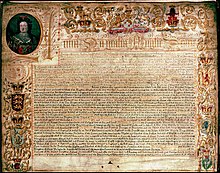 The Treaty of Union led to a united kingdom of all of Great Britain.
The Treaty of Union led to a united kingdom of all of Great Britain.On 1 May 1707, the Kingdom of Great Britain was formed, the result of Acts of Union 1707 being passed by the parliaments of England and Scotland to ratify the 1706 Treaty of Union and so unite the two kingdoms.[19]
In the 18th century, cabinet government developed under Robert Walpole, in practice the first prime minister (1721–1742). A series of Jacobite Uprisings sought to remove the Protestant House of Hanover from the British throne and restore the Catholic House of Stuart. The Jacobites were finally defeated at the Battle of Culloden in 1746, after which the Scottish Highlanders were forcibly assimilated into the rest of Scotland by revoking the feudal independence of clan chiefs. The British colonies in North America that broke away from Britain in the American War of Independence became the United States of America, recognised by Britain in 1783. British imperial ambition turned towards Asia, particularly to India.[20]
Britain played a leading part in the Atlantic slave trade, mainly between 1662 and 1807 when British or British-colonial slave ships transported nearly 3.3 million slaves from Africa.[21] The slaves were taken to work on plantations in British possessions, principally in the Caribbean but also North America.[22] Slavery coupled with the Caribbean sugar industry had a significant role in strengthening and developing the British economy in the 18th century.[23] However, with pressure from the abolitionism movement, Parliament banned the trade in 1807, banned slavery in the British Empire in 1833, and Britain took a role in the movement to abolish slavery worldwide through the blockade of Africa and pressing other nations to end their trade with a series of treaties.[24]
United Kingdom of Great Britain and IrelandThe term "United Kingdom" became official in 1801 when the parliaments of Great Britain and Ireland each passed an Act of Union, uniting the two kingdoms and creating the United Kingdom of Great Britain and Ireland.[25]
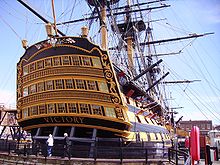 HMS Victory was Lord Nelson's flagship at the victory at the Battle of Trafalgar, in 1805.
HMS Victory was Lord Nelson's flagship at the victory at the Battle of Trafalgar, in 1805.After the defeat of France at the end of the French Revolutionary Wars and Napoleonic Wars (1792–1815), the United Kingdom emerged as the principal naval and imperial power of the 19th century (with London the largest city in the world from about 1830).[26] Unchallenged at sea, British dominance was later described as Pax Britannica ("British Peace"), a period of relative peace among the Great Powers (1815–1914) during which the British Empire became the global hegemon and adopted the role of global policeman.[27] By the time of the Great Exhibition of 1851, Britain was described as the "workshop of the world".[28] From 1853 to 1856, Britain took part in the Crimean War, allied with the Ottoman Empire in the fight against the Russian Empire,[29] participating in the naval battles of the Baltic Sea known as the Åland War in the Gulf of Bothnia and the Gulf of Finland, among others.[30] The British Empire was expanded to include India, large parts of Africa and many other territories throughout the world. Alongside the formal control it exerted over its own colonies, British dominance of much of world trade meant that it effectively controlled the economies of many regions, such as Asia and Latin America.[31]
Political attitudes favoured free trade and laissez-faire policies and a gradual widening of the voting franchise. During the century, the population increased at a dramatic rate, accompanied by rapid urbanisation, causing significant social and economic stresses.[32] To seek new markets and sources of raw materials, the Conservative Party under Disraeli launched a period of imperialist expansion in Egypt, South Africa, and elsewhere. Canada, Australia and New Zealand became self-governing dominions.[33] After the turn of the century, Britain's industrial dominance was challenged by Germany and the United States.[34] Social reform and home rule for Ireland were important domestic issues after 1900. The Labour Party emerged from an alliance of trade unions and small socialist groups in 1900, and suffragettes campaigned from before 1914 for women's right to vote.[35]
World wars and partition of Ireland Wreaths being laid during the Remembrance Sunday service at the Cenotaph in Whitehall, London
Wreaths being laid during the Remembrance Sunday service at the Cenotaph in Whitehall, LondonBritain was one of the principal Allies that fought against the Central Powers in the First World War (1914–1918). Alongside their French, Russian and (after 1917) American counterparts,[36] British armed forces were engaged across much of the British Empire and in several regions of Europe, particularly on the Western Front.[37] The high fatalities of trench warfare caused the loss of much of a generation of men, with lasting social effects in the nation and a great disruption in the social order. After the war, Britain became a permanent member of the Executive Council of the League of Nations and received a mandate over a number of former German and Ottoman colonies. The British Empire reached its greatest extent, covering a fifth of the world's land surface and a quarter of its population.[38] Britain had suffered 2.5 million casualties and finished the war with a huge national debt.[37] The consequences of the war persuaded the government to expand the right to vote in national and local elections with the Representation of the People Act 1918.[37]
By the mid-1920s, most of the British population could listen to BBC radio programmes.[39][40] Experimental television broadcasts began in 1929 and the first scheduled BBC Television Service commenced in 1936.[41] The rise of Irish nationalism, and disputes within Ireland over the terms of Irish Home Rule, led eventually to the partition of the island in 1921.[42] The Irish Free State became independent, initially with Dominion status in 1922, and unambiguously independent in 1931. Northern Ireland remained part of the United Kingdom.[43] The 1928 Equal Franchise Act gave women electoral equality with men in national elections. A wave of strikes in the mid-1920s culminated in the General Strike of 1926. Britain had still not recovered from the effects of the First World War when the Great Depression (1929–1932) occurred. This led to considerable unemployment and hardship in the old industrial areas, as well as political and social unrest in the 1930s, with rising membership in communist and socialist parties. A coalition government was formed in 1931.[44]
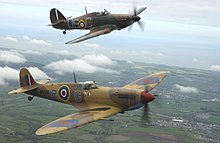 Spitfire and Hurricane as flown in the Battle of Britain during World War II
Spitfire and Hurricane as flown in the Battle of Britain during World War IINonetheless, "Britain was a very wealthy country, formidable in arms, ruthless in pursuit of its interests and sitting at the heart of a global production system."[45] After Nazi Germany invaded Poland, Britain entered the Second World War by declaring war on Germany in 1939. Winston Churchill became prime minister and head of a coalition government in 1940. Despite the defeat of its European allies in the first year of the war, Britain and its Empire continued the war against Germany. Churchill engaged industry, scientists and engineers to advise and support the government and the military in the prosecution of the war effort.[45]
In 1940, the Royal Air Force defeated the German Luftwaffe in a struggle for control of the skies in the Battle of Britain. Urban areas suffered heavy bombing during the Blitz. The Grand Alliance of Britain, the United States and the Soviet Union formed in 1941, leading the Allies against the Axis powers. There were eventual hard-fought victories in the Battle of the Atlantic, the North Africa campaign and the Italian campaign. British forces played an important role in the Normandy landings of 1944 and the liberation of Europe, achieved with its allies the United States, the Soviet Union and other Allied countries. The British Army led the Burma campaign against Japan, and the British Pacific Fleet fought Japan at sea. British scientists contributed to the Manhattan Project to design a nuclear weapon,[46] which led to the surrender of Japan.
Postwar 20th century The British Empire at its territorial peak in 1921
The British Empire at its territorial peak in 1921During the Second World War, the UK was one of the Big Three powers (along with the U.S. and the Soviet Union) who met to plan the post-war world;[47] it was an original signatory to the Declaration by United Nations. After the war, the UK became one of the five permanent members of the United Nations Security Council and worked closely with the United States to establish the IMF, World Bank and NATO.[48] The war left the UK severely weakened and financially dependent on the Marshall Plan,[49] but it was spared the total war that devastated eastern Europe.[50]
In the immediate post-war years, the Labour government initiated a radical programme of reforms, which had a significant effect on British society in the following decades.[51] Major industries and public utilities were nationalised, a welfare state was established, and a comprehensive, publicly funded healthcare system, the National Health Service, was created.[52] The rise of nationalism in the colonies coincided with Britain's now much-diminished economic position, so that a policy of decolonisation was unavoidable. Independence was granted to India and Pakistan in 1947.[53] Over the next three decades, most colonies of the British Empire gained their independence, with all those that sought independence supported by the UK, during the transition period and afterwards. Many became members of the Commonwealth of Nations.[54]
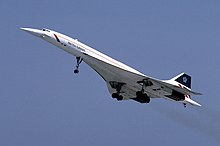 Concorde was a supersonic airliner that reduced transatlantic flight time from 8 hours to 3.5 hours.[55]
Concorde was a supersonic airliner that reduced transatlantic flight time from 8 hours to 3.5 hours.[55]The UK was the third country to develop a nuclear weapons arsenal (with its first atomic bomb test, Operation Hurricane, in 1952), but the new post-war limits of Britain's international role were illustrated by the Suez Crisis of 1956. The international spread of the English language ensured the continuing international influence of its literature and culture.[56][57] As a result of a shortage of workers in the 1950s, the government encouraged immigration from Commonwealth countries. In the following decades, the UK became a more multi-ethnic society than before.[58] Despite rising living standards in the late 1950s and 1960s, the UK's economic performance was less successful than many of its main competitors such as France, West Germany and Japan.
In the decades-long process of European integration, the UK was a founding member of the alliance called the Western European Union, established with the London and Paris Conferences in 1954. In 1960 the UK was one of the seven founding members of the European Free Trade Association (EFTA), but in 1973 it left to join the European Communities (EC). In a 1975 referendum 67% voted to stay in it.[59] When the EC became the European Union (EU) in 1992, the UK was one of the 12 founding member states. The Treaty of Lisbon, signed in 2007, forms the constitutional basis of the European Union since then.
From the late 1960s, Northern Ireland suffered communal and paramilitary violence (sometimes affecting other parts of the UK) conventionally known as the Troubles. It is usually considered to have ended with the Belfast "Good Friday" Agreement of 1998.[60]
Following a period of widespread economic slowdown and industrial strife in the 1970s, the Conservative government of the 1980s under Margaret Thatcher initiated a radical policy of monetarism, deregulation, particularly of the financial sector (for example, the Big Bang in 1986) and labour markets, the sale of state-owned companies (privatisation), and the withdrawal of subsidies to others.[61]
In 1982, Argentina invaded the British territories of South Georgia and the Falkland Islands. The occupation provoked a military response from the United Kingdom leading to the Falklands War which lasted for 10 weeks. Argentine forces were defeated and surrendered to British troops. The inhabitants of the islands are predominantly descendants of British settlers, and strongly favour British sovereignty, as shown by a 2013 referendum. From 1984, the UK economy was helped by the inflow of substantial North Sea oil revenues.[62]
Around the end of the 20th century, there were major changes to the governance of the UK with the establishment of devolved administrations for Scotland, Wales and Northern Ireland.[63] The statutory incorporation followed acceptance of the European Convention on Human Rights. The UK remained a Great Power with global diplomatic and military influence and a leading role in the United Nations and NATO.[64]
21st century 2 billion doses of Oxford University-AstraZeneca COVID-19 vaccine were sent to more than 170 countries by November 2021.[65]
2 billion doses of Oxford University-AstraZeneca COVID-19 vaccine were sent to more than 170 countries by November 2021.[65]The UK broadly supported the United States' approach to the "war on terror" in the early years of the 21st century.[66] Controversy surrounded some of Britain's overseas military deployments, particularly in Afghanistan and Iraq.[67]
The 2008 global financial crisis severely affected the UK economy. The Cameron–Clegg coalition government of 2010 introduced austerity measures intended to tackle the substantial public deficits which resulted.[68] The devolved Scottish Government and UK Government agreed for a referendum to be held on Scottish independence in 2014.[69] This referendum resulted in the electorate in Scotland voting by 55.3 to 44.7% for Scotland to remain part of the United Kingdom.[70]
In 2016, 51.9 per cent of voters in the United Kingdom voted to leave the European Union as a member state.[71] The UK left the EU on 31 January 2020 and completed its withdrawal in full at the end of that year.[72] On 1 May 2021 the Trade and Cooperation Agreement came into force which was a free trade agreement between the UK and the EU.[73]
The COVID-19 pandemic had a severe impact on the UK's economy, caused major disruptions to education and had far-reaching impacts on society and politics in 2020 and 2021.[74][75][76] The United Kingdom was the first country in the world to use an approved COVID-19 vaccine, they also developed their own vaccine between Oxford University and AstraZeneca which allowed them to roll-out the vaccine nationwide quickly.[77][78]
On 8 September 2022, Elizabeth II, the longest-living and longest-reigning British monarch, died at the age of 96.[79] Upon the Queen's death, her eldest child Charles, Prince of Wales, acceded to the British throne as King Charles III.[80]
^ "Ancient skeleton was 'even older'". BBC News. 30 October 2007. Retrieved 27 April 2011. ^ Koch, John T. (2006). Celtic culture: A historical encyclopedia. Santa Barbara, CA: ABC-CLIO. p. 973. ISBN 978-1-85109-440-0. ^ Davies, John; Jenkins, Nigel; Baines, Menna; Lynch, Peredur I., eds. (2008). The Welsh Academy Encyclopaedia of Wales. Cardiff: University of Wales Press. p. 915. ISBN 978-0-7083-1953-6. ^ "Short Athelstan biography". BBC History. Retrieved 9 April 2013. ^ Mackie, J.D. (1991). A History of Scotland. London: Penguin. pp. 18–19. ISBN 978-0-14-013649-4.; Campbell, Ewan (1999). Saints and Sea-kings: The First Kingdom of the Scots. Edinburgh: Canongate. pp. 8–15. ISBN 978-0-86241-874-8. ^ Haigh, Christopher (1990). The Cambridge Historical Encyclopedia of Great Britain and Ireland. Cambridge University Press. p. 30. ISBN 978-0-521-39552-6. ^ Ganshof, F.L. (1996). Feudalism. University of Toronto. p. 165. ISBN 978-0-8020-7158-3. ^ Chibnall, Marjorie (1999). The Debate on the Norman Conquest. Manchester University Press. pp. 115–122. ISBN 978-0-7190-4913-2. ^ Keen, Maurice. "The Hundred Years' War". BBC History. ^ The Reformation in England and Scotland and Ireland: The Reformation Period & Ireland under Elizabeth I, Encyclopædia Britannica Online. ^ "English Reformation c1527-1590". The National Archives. Retrieved 20 January 2023. ^ "British History in Depth – Wales under the Tudors". BBC History. 5 November 2009. Retrieved 21 September 2010. ^ Nicholls, Mark (1999). A history of the modern British Isles, 1529–1603: The two kingdoms. Oxford: Blackwell. pp. 171–172. ISBN 978-0-631-19334-0. ^ Canny, Nicholas P. (2003). Making Ireland British, 1580–1650. Oxford University Press. pp. 189–200. ISBN 978-0-19-925905-2. ^ Ross, D. (2002). Chronology of Scottish History. Glasgow: Geddes & Grosset. p. 56. ISBN 978-1-85534-380-1; Hearn, J. (2002). Claiming Scotland: National Identity and Liberal Culture. Edinburgh University Press. p. 104. ISBN 978-1-902930-16-9 ^ "English Civil Wars". Encyclopædia Britannica. Retrieved 28 April 2013.; "Scotland and the Commonwealth: 1651–1660". Archontology.org. 14 March 2010. Retrieved 9 March 2015. ^ Lodge, Richard (2007) [1910]. The History of England – From the Restoration to the Death of William III (1660–1702). Read Books. p. 8. ISBN 978-1-4067-0897-4. ^ "Tudor Period and the Birth of a Regular Navy". Royal Navy History. Institute of Naval History. Archived from the original on 3 November 2011. Retrieved 8 March 2015.; Canny, Nicholas (1998). The Origins of Empire, The Oxford History of the British Empire Volume I. Oxford University Press. ISBN 978-0-19-924676-2. ^ "Articles of Union with Scotland 1707". UK Parliament. Retrieved 19 October 2008.; "Acts of Union 1707". UK Parliament. Retrieved 6 January 2011.; "Treaty (act) of Union 1706". Scottish History online. Archived from the original on 27 May 2019. Retrieved 3 February 2011. ^ Library of Congress, The Impact of the American Revolution Abroad, p. 73. ^ Morgan, Kenneth (2007). Slavery and the British Empire: From Africa to America. Oxford University Press, USA. p. 12. ISBN 978-0-19-156627-1. ^ Morgan, Kenneth (2007). Slavery and the British Empire: From Africa to America. Oxford University Press, USA. p. 15. ISBN 978-0-19-156627-1. ^ Morgan, Kenneth (2007). Slavery and the British Empire: From Africa to America. OUP Oxford. p. 83. ISBN 978-0-19-923899-6. ^ Sailing against slavery. BBC Devon. 2007.; Lovejoy, Paul E. (2000). Transformations in Slavery: A History of Slavery in Africa (2nd ed.). New York: Cambridge University Press. p. 290. ISBN 978-0-521-78012-4. ^ "The Act of Union". Act of Union Virtual Library. Archived from the original on 15 April 2012. Retrieved 15 May 2006. ^ Tellier, L.-N. (2009). Urban World History: an Economic and Geographical Perspective. Quebec: PUQ. p. 463. ISBN 978-2-7605-1588-8. ^ Johnston, pp. 508–510.; Porter, p. 332.; Sondhaus, L. (2004). Navies in Modern World History. London: Reaktion Books. p. 9. ISBN 978-1-86189-202-7.; Porter, Andrew (1998). The Nineteenth Century, The Oxford History of the British Empire Volume III. Oxford University Press. p. 332. ISBN 978-0-19-924678-6. ^ "The Workshop of the World". BBC History. Retrieved 28 April 2013. ^ Benn, David Wedgwood (March 2012). "The Crimean War and its lessons for today". International Affairs. Oxford University Press. 88 (2): 387–391. doi:10.1111/j.1468-2346.2012.01078.x. JSTOR 41428613. ^ Nordisk familjebok (1913), s. 435 (in Swedish) ^ Porter, Andrew (1998). The Nineteenth Century, The Oxford History of the British Empire Volume III. Oxford University Press. p. 8. ISBN 978-0-19-924678-6.; Marshall, P.J. (1996). The Cambridge Illustrated History of the British Empire. Cambridge University Press. pp. 156–157. ISBN 978-0-521-00254-7. ^ Tompson, Richard S. (2003). Great Britain: a reference guide from the Renaissance to the present. New York: Facts on File. p. 63. ISBN 978-0-8160-4474-0. ^ Hosch, William L. (2009). World War I: People, Politics, and Power. America at War. New York: Britannica Educational Publishing. p. 21. ISBN 978-1-61530-048-8. ^ Zarembka, Paul (2013). Contradictions: Finance, Greed, and Labor Unequally Paid. Emerald Group Publishing. ISBN 978-1-78190-670-5. ^ Sophia A. Van Wingerden, The women's suffrage movement in Britain, 1866–1928 (1999) ch 1. ^ Turner, John (1988). Britain and the First World War. London: Unwin Hyman. pp. 22–35. ISBN 978-0-04-445109-9. ^ a b c Westwell, I.; Cove, D. (eds) (2002). History of World War I, Volume 3. London: Marshall Cavendish. pp. 698 and 705. ISBN 978-0-7614-7231-5. ^ Turner, J. (1988). Britain and the First World War. Abingdon: Routledge. p. 41. ISBN 978-0-04-445109-9. ^ "100 years of radio since Marconi's big breakthrough". Ofcom. 15 June 2020. Retrieved 17 November 2020. ^ Linfoot, Matthew. "History of the BBC: The origins of BBC Local Radio". bbc.com. Retrieved 18 September 2022. ^ "History of the BBC: 1920s". bbc.com. Retrieved 18 September 2022. ^ SR&O 1921, No. 533 of 3 May 1921. ^ "The Anglo-Irish Treaty, 6 December 1921". CAIN Web Service. Retrieved 15 May 2006. ^ Rubinstein, W.D. (2004). Capitalism, Culture, and Decline in Britain, 1750–1990. Abingdon: Routledge. p. 11. ISBN 978-0-415-03719-8. ^ a b Edgerton, David (2012). Britain's War Machine. www.penguin.co.uk. Retrieved 10 May 2020; "Britain's War Machine: Weapons, Resources and Experts in the Second World War". Reviews in History. Retrieved 10 May 2020. ^ Septimus H. Paul (2000). Nuclear Rivals: Anglo-American Atomic Relations, 1941–1952. Ohio State U.P. pp. 1–5. ISBN 9780814208526. ^ Doenecke, Justus D.; Stoler, Mark A. (2005). Debating Franklin D. Roosevelt's foreign policies, 1933–1945. ISBN 978-0-8476-9416-7. Retrieved 19 March 2016.; Kelly, Brian. The Four Policemen and Postwar Planning, 1943–1945: The Collision of Realist and Idealist Perspectives. Indiana University of Pennsylvania. Retrieved 25 August 2015. ^ "The "Special Relationship" between Great Britain and the United States Began with FDR". Roosevelt Institute. 22 July 2010. Archived from the original on 25 January 2018. Retrieved 24 January 2018. and the joint efforts of both powers to create a new post-war strategic and economic order through the drafting of the Atlantic Charter; the establishment of the International Monetary Fund and the World Bank; and the creation of the United Nations.; "Remarks by the President Obama and Prime Minister Cameron in Joint Press Conference" (Press release). The White House. 22 April 2016. Retrieved 24 January 2018. That's what we built after World War II. The United States and the UK designed a set of institutions – whether it was the United Nations, or the Bretton Woods structure, IMF, World Bank, NATO, across the board. ^ "Britain to make its final payment on World War II loan from U.S." The New York Times. 28 December 2006. Retrieved 25 August 2011. ^ Reynolds, David (17 April 2011). "Britain's War Machine by David Edgerton – review". The Guardian. London. Retrieved 10 May 2020. ^ Francis, Martin (1997). Ideas and policies under Labour, 1945–1951: Building a new Britain. Manchester University Press. pp. 225–233. ISBN 978-0-7190-4833-3. ^ Lee, Stephen J. (1996). Aspects of British political history, 1914–1995. London; New York: Routledge. pp. 173–199. ISBN 978-0-415-13103-2. ^ Larres, Klaus (2009). A companion to Europe since 1945. Chichester: Wiley-Blackwell. p. 118. ISBN 978-1-4051-0612-2. ^ "Country List". Commonwealth Secretariat. 19 March 2009. Archived from the original on 6 May 2013. Retrieved 8 March 2015. ^ "Celebrating Concorde". Archived from the original on 17 March 2023. Retrieved 30 March 2023. ^ Cite error: The named reference culture was invoked but never defined (see the help page). ^ Cite error: The named reference sheridan was invoked but never defined (see the help page). ^ Julios, Christina (2008). Contemporary British identity: English language, migrants, and public discourse. Studies in migration and diaspora. Aldershot: Ashgate. p. 84. ISBN 978-0-7546-7158-9. ^ "1975: UK embraces Europe in referendum". BBC News. Retrieved 8 March 2015. ^ Aughey, Arthur (2005). The Politics of Northern Ireland: Beyond the Belfast Agreement. London: Routledge. p. 7. ISBN 978-0-415-32788-6.; "The troubles were over, but the killing continued. Some of the heirs to Ireland's violent traditions refused to give up their inheritance." Holland, Jack (1999). Hope against History: The Course of Conflict in Northern Ireland. New York: Henry Holt. p. 221. ISBN 978-0-8050-6087-4.; Elliot, Marianne (2007). The Long Road to Peace in Northern Ireland: Peace Lectures from the Institute of Irish Studies at Liverpool University. University of Liverpool Institute of Irish Studies, Liverpool University Press. p. 2. ISBN 978-1-84631-065-2. ^ Dorey, Peter (1995). British politics since 1945. Making contemporary Britain. Oxford: Blackwell. pp. 164–223. ISBN 978-0-631-19075-2. ^ Griffiths, Alan; Wall, Stuart (2007). Applied Economics (PDF) (11th ed.). Harlow: Financial Times Press. p. 6. ISBN 978-0-273-70822-3. Retrieved 26 December 2010. ^ Keating, Michael (1 January 1998). "Reforging the Union: Devolution and Constitutional Change in the United Kingdom". Publius: The Journal of Federalism. 28 (1): 217–234. doi:10.1093/oxfordjournals.pubjof.a029948. ^ McCourt, David (2014). Britain and World Power Since 1945: Constructing a Nation's Role in International Politics. University of Michigan Press. ISBN 978-0-472-07221-7. ^ "The story behind the Oxford-AstraZeneca COVID-19 vaccine success". UK Research and Innovation. Archived from the original on 25 February 2023. ^ McSmith, Andy (5 July 2016). "The inside story of how Tony Blair led Britain to war in Iraq". The Independent. Retrieved 17 February 2022. ^ Jackson, Mike (3 April 2011). "Military action alone will not save Libya". Financial Times. London. Archived from the original on 27 August 2011. ^ "United Kingdom country profile (2013 version)". BBC News (archived). 24 January 2013. Archived from the original on 8 April 2013. Retrieved 9 April 2013. ^ Black, Andrew (15 October 2012). "Scottish independence: Cameron and Salmond strike referendum deal". BBC News. Retrieved 18 February 2022. ^ "Scottish independence referendum – Results – BBC News". bbc.co.uk. Retrieved 18 February 2022. ^ "In stunning decision, Britain votes to leave the E.U." The Washington Post. 24 June 2016. Retrieved 24 June 2016. ^ "Brexit: New era for UK as it completes separation from European Union". BBC News. 1 January 2021. Retrieved 18 February 2022. ^ Cite error: The named reference commission.europa.eu was invoked but never defined (see the help page). ^ "Coronavirus (COVID-19) in the UK". gov.uk. Government of the United Kingdom. Archived from the original on 14 April 2020. Retrieved 15 April 2020. ^ "Coronavirus and the impact on output in the UK economy: April 2020". ons.gov.uk. Government of the United Kingdom. Archived from the original on 2 August 2020. Retrieved 2 August 2020. ^ Walker, Andrew (10 June 2020). "Coronavirus: UK economy could be among worst hit of leading nations, says OECD". BBC News. Archived from the original on 18 August 2020. Retrieved 2 August 2020. ^ "Landmark moment as first NHS patient receives COVID-19 vaccination". NHS. Archived from the original on 25 February 2023. ^ "Oxford University/AstraZeneca COVID-19 vaccine approved". UK Government. Archived from the original on 25 February 2023. ^ "Queen Elizabeth II has died". BBC News. 8 September 2022. Archived from the original on 8 September 2022. Retrieved 8 September 2022. ^ "King Charles III, the new monarch". BBC News. 8 September 2022. Retrieved 8 September 2022.
- Stay safe
In general the UK is a safe place to visit; you won't go far wrong heeding the general advice and the advice for Europe.
Emergency servicesAre you in crisis?
Samaritans is a free and confidential nationwide 24 hour telephone hotline for people in emotional distress. The concept is simple: you talk, they listen. Please don't suffer alone; call a Samaritan on ☏ 116 123 (in country only).
In any emergency call 999 or 112 (free of charge from any phone, including mobiles). All such calls are free and will be answered by an emergency services operator who will ask you which services you need (police, fire, ambulance, coastguard or mountain and cave rescue) and for your location. Be as precise as possible, and don't forget to say the town or city, as the operator may be based remotely. Unlike many other countries, the United Kingdom does not have different numbers for different emergency services.
...Read moreStay safeRead lessIn general the UK is a safe place to visit; you won't go far wrong heeding the general advice and the advice for Europe.
Emergency servicesAre you in crisis?
Samaritans is a free and confidential nationwide 24 hour telephone hotline for people in emotional distress. The concept is simple: you talk, they listen. Please don't suffer alone; call a Samaritan on ☏ 116 123 (in country only).
In any emergency call 999 or 112 (free of charge from any phone, including mobiles). All such calls are free and will be answered by an emergency services operator who will ask you which services you need (police, fire, ambulance, coastguard or mountain and cave rescue) and for your location. Be as precise as possible, and don't forget to say the town or city, as the operator may be based remotely. Unlike many other countries, the United Kingdom does not have different numbers for different emergency services.
You can call 999 or 112 from any mobile telephone, even if you do not have roaming enabled. As in all other countries, it is a serious crime to call this number without due cause, the official criteria being, an immediate serious threat to life or safety. In making an emergency call, give as much information about your location (and that of the incident needing attention) as possible. Official call boxes will typically have location plate giving this, but a street name or building name can also be given. In rural or remote areas, giving a precise map (or GPS) reference will assist immensely. In addition the operator may prompt you for additional information which will allow categorisation of the emergency to prioritise the response. With variable mobile coverage in some areas, mobiles can call the 999 or 112 emergency number even when they only have coverage from a network other than from their own provider. Unlike normal roaming, only 999 or 112 emergency calls will be passed; whilst you can call the emergency services, they cannot call you back. Even if your phone shows No Signal, in an emergency it is still worth trying as you may be in coverage of another network who will handle your 999 (or 112) emergency call. In some incidents the emergency operator may ask you to stay on the line, so they can provide additional information, or monitor for situational changes. In such situations, do not hang up until they advise that you can.
In a non-emergency situation you can call 101 to report crime and concerns to the local police that do not require an emergency response. A similar service is available at 111 for health issues that do not require urgent A&E admission.
Police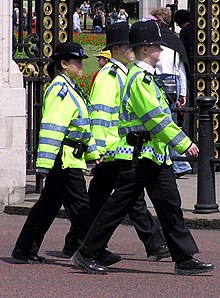 A group of British police officers on patrol.
A group of British police officers on patrol.ID Cards
Unlike many other countries, British people do not have ID Cards and are not required to carry identification on them at all times. A police officer will not ask to arbitrarily see your ID, although it may save you a good deal of time to have one if they believe you are a 'person of interest'. Additionally, under 25s who look like they may be minors are routinely asked for some form of official ID when purchasing alcohol or tobacco, or when entering bars or nightclubs with on-door security. A European driving licence is a popular form of ID in the United Kingdom, although a non-European driving license, ID card or passport from your home country is sufficient.
On the whole, British police officers tend to be professional and trustworthy, and are generally less aggressive than law enforcement agencies in many other developed nations. However, this does not mean they are lenient, and they will intervene if a situation is assessed as needing a police response. Front line police officers will also not be hesitant in responding to sincerely expressed safety concerns, such as unattended baggage, lost children, or individuals that have 'had too much' alcohol.
With local exceptions, such as airports, nuclear power plants and some government buildings, the vast majority of police officers in Great Britain do not carry firearms on standard patrol, and the only police officers allowed to carry firearms are those from specialist firearms units. The exception is the police in Northern Ireland who routinely carry firearms due to the historical political tension.
Most officers will only speak English, though you will be able to speak to an interpreter over police radio if you can't understand questioning in English. You have the right to an interpreter at the police station, as well as a solicitor (lawyer) that can be provided for you free of charge if you are to be interviewed. You have a right to remain silent when interviewed. However, in all parts of the UK except Scotland this right is qualified; your silence can be held against you in court in certain circumstances.
No instant penalties are payable in cash to a police officer and street-level corruption is for all practical purposes non-existent. Under UK law, bribing a police officer is a very serious crime for both the officer accepting and person offering the bribe.
Police officers in Great Britain wear dark blue uniforms, although officers in Northern Ireland wear dark green uniforms. Front-line police (in uniform) are also generally required to have shoulder numbers. Most British police are also required to carry a 'warrant card' , and should under reasonable circumstances be willing to produce it, to confirm their authority.
Policing on the mainland rail network, is the responsibility of the British Transport Police, who have similar powers and responsibilities to other police in the UK.
In addition to police officers with full powers, in some areas the UK has Community Support Officers, whose powers are more limited, and are generally concerned with policing issues of a less serious nature, freeing up police officers to handle more serious offences.
Private security guards do not generally have any "police-style" powers at all. There are a small number of non-police officials who have limited enforcement powers relating to specific local areas; or certain activities such as on-street parking, use of public spaces; or concerning local bylaws. Railway staff also have specific responsibilities with respect to the Railway's Bylaws and Conditions of Carriage.
All British people have the right to make a citizens arrest, where they can arrest and temporarily detain people who have committed a indictable offence until the arrival of the police who will take custody of the offender.
On the roadsAlthough jaywalking is not an offence in the UK, crossing a road other than at a designated crossing should be taken with care. A number of traffic light crossings have a push button to change the 'man' from red to green. Pedestrian crossings in some cities (notably London) have countdown timers, to indicate when the lights will revert to red. Pedestrians have right of way on zebra crossings, that are identified by white stripes on the road and yellow flashing lights. It is advisable to make eye contact with the driver before stepping into the road. Certain roads prohibit pedestrians (and cylicsts), this is often marked with signs in clearly visible locations.
Public transportBritain's transport network does not generally have any major safety issues. Major incidents are exceptionally rare (despite the media attention). Vigilance about security and safety issues (such as suspect packages, and unattended luggage) is however appreciated, and the employees of transport organizations are generally appreciative of appropriately voiced concerns.
RacismOvert racism is not common in the UK and racially motivated violence is rare. The government strongly encourages the notion of a multi-cultural society, but high levels of immigration have caused debate and the rise of political figures against immigration levels. Nevertheless, the UK is generally regarded by most of its own immigrant population as being among the most tolerant of European countries in this respect. Most Britons will go out of their way to make tourists and immigrants feel welcome and it is common for courts to impose harsh punishments on any form of racial abuse, physical or verbal. Current legislation prohibits hate speech as well as racial discrimination in a wide range of public spheres such as education and employment.
Amid the COVID-19 pandemic, there has been a spike in racist incidents targeting people of East Asian descent, with some East Asians having become victims of hate crimes including assaults.
Public drunkennessLate at night it is not uncommon to find rowdy groups of drunk people, especially young men, on the street, but unless you go out of your way to provoke trouble you are unlikely to experience any problems. The police have fairly wide ranging powers to fine or arrest people who are causing a disturbance, and although they can be more heavy-handed in major cities they are generally tolerant. Drinking alcohol in public (except outside a bar or pub) is not permitted in some towns and areas of cities.
Illegal drugsAll illegal drugs in the United Kingdom are classified under 'A', 'B' or 'C'. Class A drugs are typically regarded as the most dangerous and attract the most severe penalties (e.g. a prison sentence), especially for supplying. Class C are generally regarded as the least harmful and thus attract lesser penalties (e.g. a fine). Remember: all of these drugs are equally illegal and you can still be arrested for possession, supplying or using regardless of the class; the classes are used to determine policing priorities and penalties.
Class A drugs include ecstasy (MDMA), LSD, heroin and cocaine; penalties will mean arrest and prison even for possession. Magic mushrooms were previously legal because of technicalities in the law, but are now class A.
Cannabis is now a 'Class B' drug. A first offence for possession will usually result in a formal warning, or an on-the-spot fine. This does not apply to other Class B drugs, such as speed (where you will be imprisoned instead). Subsequent offences may result in arrest.
Examples of Class C include ketamine, some steroids, some prescription drugs such as Valium (legal if they are prescribed for you), GHB, Khat and some tranquillisers.
Don't assume, however, that something offered as a so called 'legal-high' is either legal, safe or even what it claims to be. Law enforcement in the UK have since 2016 had the power to act against all manner of these, and the potential for being sold something injurious is high.
Prescribed drugs will usually require a letter from a doctor to be imported, and having this documentation is useful if any queries arise. Where the drug is controlled (Class A, B or C) in the UK, a formal prescription, and confirmation of a qualified medical professional as to medical need or requirement, will be needed in all instances.
Sex and prostitutionThe age of sexual consent is 16 throughout the United Kingdom, although teenagers under 18 are also still legally regarded as children, meaning that images of under-18s, whether they are above the age of consent or not, is classed as child pornography and most definitely illegal. Ask for proof of age, e.g. driving licence if in doubt.
Homosexuality is very widely accepted by the British public, and almost all discrimination and all hate speech relating to sexual orientation is illegal.
Attitudes to prostitution in the United Kingdom are considerably less liberal than some other European countries, and are closer to the conservative views held in the United States.
Brothels of any kind are illegal and it's against the law to loiter or solicit sex on the street. 'Kerb-crawling' (driving close to a pavement in order to ask prostitutes for sex) is also banned, and is actively monitored for by police patrols in many towns and cities across the country. Police also on a regular basis undertake crackdowns against both gangs and individuals that are using trafficked women in prostitution rackets. Police take a very dim view of such activity, and if you are caught, you will be subjected to lengthy questioning by the police, and charged.
Firearms and knivesThe UK has very strict laws with regards to firearm ownership. Handguns such as pistols and revolvers, as well as semi-automatic rifles are prohibited, even for sporting purposes, while a licence is required to own, carry or use any other type of firearm. Bringing a firearm into the UK is extremely difficult, and all visitors who wish to do so are required to obtain a permit well before their arrival in the UK.
Northern Ireland has its own firearms licensing regulations (most notably handguns are legal, and self-defense is a valid reason to acquire a license), so visitors who wish to transport their firearms between Northern Ireland and the rest of the UK are required to obtain permits from both the British and Northern Irish authorities in order to do so.
Knife crime is a problem in the UK, most acutely in London and other large cities, although not as great as press reports suggest. While the majority of knife attacks are perpetrated by criminal gangs against locals who are themselves in some way connected to crime, seemingly random and unprovoked attacks have also been carried out, sometimes against foreign visitors.
TerrorismThe UK has seen a number of terror attacks in the 21st century, many of which have targeted places you're likely to frequent as a tourist. British security services are on the whole adept at preventing attacks from occurring, and in the event of a successful attack, police and ambulance services have a track record for responding extremely quickly and professionally. While in some respects it is true that you can't do much in the face of an attack, there are precautions you can take. Stay abreast of the government's official threat level and keep an eye on local media before and during your visit. In the extremely unlikely event that you are caught up in a terror attack, the official advice is to run as far away from the attackers as possible, hide in the most secure place you can find, stay put as quietly and still as possible, and phone the police only if it is safe to do so.

